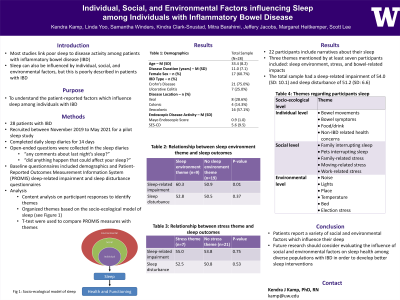Sunday Poster Session
Category: IBD
P0684 - Individual, Social, and Environmental Factors Influencing Sleep Among Individuals With Inflammatory Bowel Disease
Sunday, October 22, 2023
3:30 PM - 7:00 PM PT
Location: Exhibit Hall

Has Audio

Kendra Kamp, PhD, RN
University of Washington
Seattle, WA
Presenting Author(s)
Kendra Kamp, PhD, RN, Linda Yoo, MS, RN, Samantha Winders, PhD, RN, Kindra Clark-Snustad, DNP, Mitra Barahimi, MD, Jeffrey Jacobs, MD, Margaret E. Heitkemper, BSN, PhD, Scott D. Lee, MD
University of Washington, Seattle, WA
Introduction: Most studies link poor sleep to disease activity among patients with inflammatory bowel disease (IBD). Sleep can also be influenced by individual, social, and environmental factors, but this is poorly described in patients with IBD. The purpose of this study was to understand the patient-reported factors which influence sleep among individuals with IBD.
Methods: Twenty-eight patients with IBD were recruited between November 2019 to May 2021 for a pilot sleep study. Open-ended questions were collected in 14-day sleep diaries which asked participants “any comments about last night’s sleep?” and “did anything happen that could affect your sleep?” We performed content analysis on responses. Themes were organized based on the socio-ecological model of sleep which categorizes factors impacting sleep into individual, social, and environmental levels. Participants completed Patient-Reported Outcomes Measurement Information System (PROMIS) sleep-related impairment and sleep disturbance questionnaires. T-tests compared PROMIS measures with major themes.
Results: Participants were primarily Caucasian (89%), females (61%) with Crohn’s disease (75%). The average disease duration was 11 years and the mean age was 33.4. Twenty-two participants included narrative comments about their sleep. The three major themes were: sleep environment, stress, and bowel-related impacts (Table 1). Sleep environment had subthemes of noise, lights, place, temperature, and bed. Stress included family, work, moving, and elections. Bowel-related impacts included nocturnal bowel movements which interrupted sleep and bowel symptoms (e.g., abdominal pain and gas) which prevented patients from falling asleep. Other less frequent themes were sleep interruptions from family and pets, non-IBD health concerns symptoms and illnesses (e.g., colds, migraines, and muscle soreness), and the impacts of food and drink on sleep. Participants who reported impacts of sleep environment were more likely to have greater sleep-related impairment (60.3 vs. 50.9, p=0.01) but not sleep disturbance (52.8 vs. 50.5, p=0.37).
Discussion: Although the majority of IBD sleep studies focus on individual level factors, patients report a variety of social and environmental factors which influence their sleep. Future research should consider evaluating the influence of social and environmental factors on sleep health among diverse populations with IBD in order to develop better sleep interventions.
Disclosures:
Kendra Kamp, PhD, RN, Linda Yoo, MS, RN, Samantha Winders, PhD, RN, Kindra Clark-Snustad, DNP, Mitra Barahimi, MD, Jeffrey Jacobs, MD, Margaret E. Heitkemper, BSN, PhD, Scott D. Lee, MD. P0684 - Individual, Social, and Environmental Factors Influencing Sleep Among Individuals With Inflammatory Bowel Disease, ACG 2023 Annual Scientific Meeting Abstracts. Vancouver, BC, Canada: American College of Gastroenterology.
University of Washington, Seattle, WA
Introduction: Most studies link poor sleep to disease activity among patients with inflammatory bowel disease (IBD). Sleep can also be influenced by individual, social, and environmental factors, but this is poorly described in patients with IBD. The purpose of this study was to understand the patient-reported factors which influence sleep among individuals with IBD.
Methods: Twenty-eight patients with IBD were recruited between November 2019 to May 2021 for a pilot sleep study. Open-ended questions were collected in 14-day sleep diaries which asked participants “any comments about last night’s sleep?” and “did anything happen that could affect your sleep?” We performed content analysis on responses. Themes were organized based on the socio-ecological model of sleep which categorizes factors impacting sleep into individual, social, and environmental levels. Participants completed Patient-Reported Outcomes Measurement Information System (PROMIS) sleep-related impairment and sleep disturbance questionnaires. T-tests compared PROMIS measures with major themes.
Results: Participants were primarily Caucasian (89%), females (61%) with Crohn’s disease (75%). The average disease duration was 11 years and the mean age was 33.4. Twenty-two participants included narrative comments about their sleep. The three major themes were: sleep environment, stress, and bowel-related impacts (Table 1). Sleep environment had subthemes of noise, lights, place, temperature, and bed. Stress included family, work, moving, and elections. Bowel-related impacts included nocturnal bowel movements which interrupted sleep and bowel symptoms (e.g., abdominal pain and gas) which prevented patients from falling asleep. Other less frequent themes were sleep interruptions from family and pets, non-IBD health concerns symptoms and illnesses (e.g., colds, migraines, and muscle soreness), and the impacts of food and drink on sleep. Participants who reported impacts of sleep environment were more likely to have greater sleep-related impairment (60.3 vs. 50.9, p=0.01) but not sleep disturbance (52.8 vs. 50.5, p=0.37).
Discussion: Although the majority of IBD sleep studies focus on individual level factors, patients report a variety of social and environmental factors which influence their sleep. Future research should consider evaluating the influence of social and environmental factors on sleep health among diverse populations with IBD in order to develop better sleep interventions.
| Socio-ecological Level | Theme |
| Individual Level |
|
| Social Level |
|
| Environmental Level |
|
Table: Factors influencing sleep among individuals with inflammatory bowel disease, based on socio-ecological levels
Disclosures:
Kendra Kamp indicated no relevant financial relationships.
Linda Yoo indicated no relevant financial relationships.
Samantha Winders indicated no relevant financial relationships.
Kindra Clark-Snustad indicated no relevant financial relationships.
Mitra Barahimi indicated no relevant financial relationships.
Jeffrey Jacobs: Bristol Meyers Squibb – Advisory Committee/Board Member.
Margaret Heitkemper indicated no relevant financial relationships.
Scott Lee: AbbVie – Grant/Research Support. AbGenomics – Grant/Research Support. Applied Molecular Transport, Arena, Boehringer Ingelheim – Consultant. Arena – Grant/Research Support. Bridge Biotherapeutics – Consultant. Bristol-Myers Squibb – Consultant. Celgene – Consultant. Celgene – Grant/Research Support. Celltrion Healthcare – Consultant. Celltrion Healthcare – Grant/Research Support. Cornerstones Health – Consultant. Eli Lilly and Company – Consultant. Janssen – Consultant. Janssen – Grant/Research Support. KCRN Research – Consultant. Salix – Grant/Research Support. Samsung Bioepis and UCB – Consultant. Takeda – Grant/Research Support. UCB – Grant/Research Support.
Kendra Kamp, PhD, RN, Linda Yoo, MS, RN, Samantha Winders, PhD, RN, Kindra Clark-Snustad, DNP, Mitra Barahimi, MD, Jeffrey Jacobs, MD, Margaret E. Heitkemper, BSN, PhD, Scott D. Lee, MD. P0684 - Individual, Social, and Environmental Factors Influencing Sleep Among Individuals With Inflammatory Bowel Disease, ACG 2023 Annual Scientific Meeting Abstracts. Vancouver, BC, Canada: American College of Gastroenterology.
